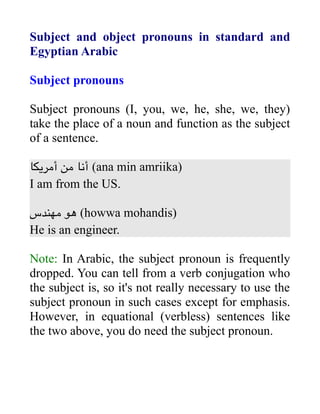
6 theory
- 1. Subject and object pronouns in standard and Egyptian Arabic Subject pronouns Subject pronouns (I, you, we, he, she, we, they) take the place of a noun and function as the subject of a sentence. أمريكا من أنا (ana min amriika) I am from the US. مهندس هو (howwa mohandis) He is an engineer. Note: In Arabic, the subject pronoun is frequently dropped. You can tell from a verb conjugation who the subject is, so it's not really necessary to use the subject pronoun in such cases except for emphasis. However, in equational (verbless) sentences like the two above, you do need the subject pronoun.
- 2. Subject pronouns in standard and Egyptian Arabic Note: In English, there is only one second-person pronoun, "you," which is used whether you're talking to one person, two people, or more. But in Arabic, as you see above, there are masculine and feminine versions of "you," as well as singular, dual (standard Arabic only), and plural versions: ِتتتناَتتتنا if you're addressing one person, تتماتتتتنأ if
- 3. you're addressing two (in standard Arabic), and تتنتتمأنأ if you're addressing three or more people. Note that the dual "you" (تتماتتتتتتتتتن)أ is the same regardless of gender. In standard Arabic, there is also a dual version of "they" (تماه - which is gender- indiscriminate as well) and masculine and feminine versions of the plural "they" (هم and .)هن Note that Egyptian Arabic has fewer pronouns than standard Arabic, since it has no dual pronouns; it just has plural pronouns that are used to talk about two or more people, of any gender. And the colloquial انتو and هم are gender-neutral. Object pronouns Object pronouns (me, you, us, him, her, them) are used when you do something directly to someone or something else. In Arabic, these pronouns are suffixes that are attached to the verb:
- 4. ضربته (Darabatu) She hit him. يشكروني (yaškuruuni) They thank me. Object pronouns in standard and Egyptian Arabic Note: In colloquial Arabic, توتتكتتتـ and تمتتكتتتـ are both used, but the former is more colloquial than the
- 5. latter. Here are some examples of object pronoun usage, using the verb سأل (sa'al) - "to ask."